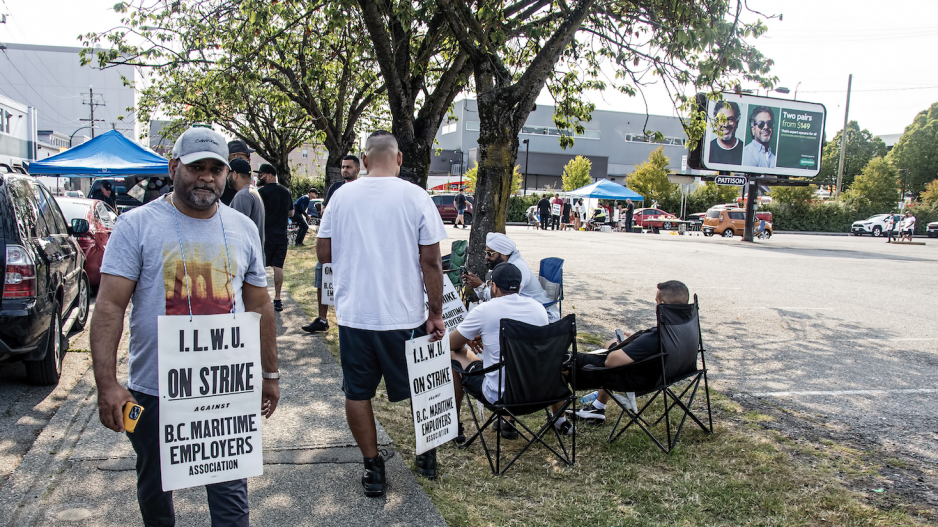At the beginning of the past weekend, business groups in sa¿º¥òǨû§ were expressing their frustrations over International Longshore and Warehouse Union sa¿º¥òǨû§’s (ILWU) rejection of one proposed settlement in the labour dispute that has disrupted cargo movement through sa¿º¥òǨû§ ports since July 1.
But with another proposal on the table at the tail-end of the weekend, there was renewed optimism that the labour dispute could be resolved soon.
The membership of the ILWU eligible to cast ballots voted yesterday (July 28) against accepting the federal mediator’s terms of settlement to resolve the impasse between the union and the sa¿º¥òǨû§ Maritime Employers Association (BCMEA) that initially resulted in a 13-day strike that began on July 1 and has resulted thus far in disruption of an estimated $10.7 billion in cargo.
After union picket lines were temporarily removed when the mediator’s terms were presented to both sides in the dispute, , but later rescinded a subsequent 72-hour strike notice to allow for a vote from the union’s rank and file.
The ILWU’s bargaining committee recommended ratification of the deal.
But after votes were tabulated on Friday [July 28], the union released a statement confirming that the deal had been rejected by its membership and called on the BCMEA to “come to the table and negotiate something that works for our members and the industry.”
Business groups like the Canadian Federation of Independent Business (CFIB) immediately expressed frustration over the union’s actions.
“After weeks of uncertainty, we’re back to square one,” Jasmin Guénette, the CFIB’s vice-president of national affairs, said in a statement. “Businesses from coast to coast are paying the price for the union’s irresponsible actions. There’s been enough damage to sa¿º¥òǨû§’s economy in the past few weeks already. The federal government must do what’s best for the country, our entrepreneurs and the economy. sa¿º¥òǨû§ ports must remain fully operational while negotiations continue. If the union issues another 72-hour strike notice, government will have to immediately introduce back-to-work legislation."
Bridgitte Anderson, president and CEO of the Greater Vancouver Board of Trade President, added that the union's second rejection of the mediated deal “will undoubtedly raise the prices of goods for Canadians and businesses relying on goods flowing through our ports. Pulp mills have been shut down, mines curtailed, and thousands of companies, big and small, have been left with higher bills for their goods. The next steps are unclear but if strike action recommences the economic damage will only increase. An agreed-upon deal has now been rejected twice by the union. It is time for the federal government and opposition parties to intervene to ensure that our ports stay open, and we can avoid needlessly stoking inflation and affecting other union and non-union jobs. It is also clear that the federal government needs additional tools to facilitate lasting agreements when labour disruptions affect the entire economy.”
BC Chamber of Commerce president and CEO Fiona Famulak agreed.
In a July 29 statement, she said, "Our port infrastructure is too critical to the health and success of our businesses, workers and national economy to let this dispute escalate any further.... The rejection of a second tentative agreement demonstrates the need for the federal government to play an even stronger role in bringing this dispute to an end.”
The BCMEA said the four-year deal rejected by the union would have provided wage increases of 19.2 per cent and would have increased the annual median union longshore wage to $162,000 from $136,000, not including benefits and pension. The deal would also provide a $3,000 signing bonus for each full-time worker.
The employers group added that, “over the course of the past 13 years, longshore wages have risen by 40 per cent, ahead of inflation at 30 per cent.”
The union has been seeking wage increases of 11 per cent in the first year of a new contract and six per cent in the second year. It has been without a contract since the ILWU’s previous five-year deal expired at the end of March.
In a statement released July 18 accompanying the union leadership’s initial rejection of the deal, ILWU president Rob Ashton said the ILWU’s internal leadership caucus “does not believe the [senior mediator’s] recommendations had the ability to protect our jobs now or into the future. With the record profits that the BCMEA's member companies have earned over the last few years the employers have not addressed the cost-of-living issues that our workers have faced over the last couple of years as all workers have.
“The term of the collective agreement that was given with today's uncertain times is far too long. We must be able to readdress the uncertainty in the world's financial markets for our members.”
But Seamus O’Regan, sa¿º¥òǨû§’s minister of labour, waded into the fray today, saying the state of uncertainty surrounding sa¿º¥òǨû§’s ports and the Asia-Pacific Gateway cannot continue. He has consequently directed the sa¿º¥òǨû§ Industrial Relations Board (CIRB) to determine whether the union’s rejection of the tentative agreement has eliminated the possibility of a negotiated resolution.
If CIRB makes that determination, O’Regan has instructed it to either impose a new contract or impose final binding arbitration to resolve the outstanding terms of the collective agreement.
In his statement, O’Regan said sa¿º¥òǨû§’s economy “cannot face further disruption from this dispute.”
Late Sunday night, both sides in the contract dispute announced in a joint statement that they had negotiated a new collective agreement with the assistance of CIRB and are recommending ratification of the deal to the union’s membership and members of the BCMEA.
@timothyrenshaw



